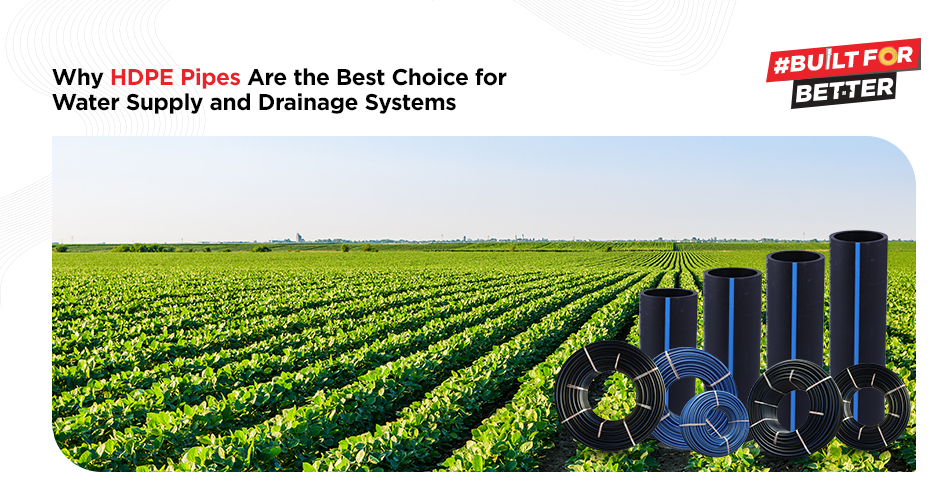Choosing appropriate pipe types creates a huge difference when talking about water supply and drainage systems. A leaky pipe, a cracking pipe, or a rusty pipe can cause lots of problems, from wasting water to expensive repairs. This is where HDPE pipes come into play. Their qualities of endurance and resistance have made them an increasingly popular option in India. These pipes are strong, last for many years, and are ideal for water supply and drainage applications.
Benefits of HDPE Pipes in Water Supply:
1. No Rust, No Corrosion
HDPE pipes have become India’s favoured pipes mainly due to resistance to rust and corrosion. While iron or steel pipes are prone to everyday wear and tear, HDPE pipes remain unaffected despite the presence of water and soil. This makes them a perfect fit for underground water supply systems where moisture is always present.
2. Leak-Proof Joints that Reduce Water Wastage
Water wastage due to leakages in pipelines is one of the most critical issues in India. A huge amount of water is consumed in pipeline leakages that find their way into needless wastage and high maintenance costs. HDPE, according to a method of welding, utilises heat fusion that welds pipes together into a contiguous joint. There is less chance of leaking, which means less water wastage.
3. Long Lifespan=Save Costs
When purchasing HDPE pipes, one may have hardly any worries about their replacement in the near future. These pipes usually last for 50 years or more, therefore, making an intelligent selection for water supply projects done in the long term. Because of their extended life, HDPE pipes would also lower maintenance and replacement costs.
4. Flexibility for All Terrains
India is a land of mountains, plains, dry areas, and flood-prone zones. Herein lie the flexible characteristics of HDPE pipes, enabling them to negotiate different terrains without cracking or breaking. Rigid pipes, under pressure, would snap; HDPE pipes, however, would bend without breaking, easing installation.
5. Suitable for Drinking Water
HDPE pipes are made with reliable material that don’t release toxins or harmful chemicals. They don’t react with water or release any contaminant and hence would be one of the safest options concerning the cleanliness and safety of drinking water.
Why HDPE Pipes Are Best Suited for Drainage Systems
1. The Interior Walls Are Smooth: No Clogging
Clogging is one of the problems that commonly exists in old drainage pipes. Waste can easily flush in and out through HDPE smooth inner pipe surfaces without causing blockages and enables a good flow of all liquid wastage that reduces the chances of bursting pipes and backflow of sewage.
2. High Impact Capacity
Heavy duty loads are placed on drainage pipes such as soil, vehicles, and many other forms of deposition. They won’t crack under heavy pressure because of the amazing impact, strength and capability that these HDPE pipes have. This makes them ideal measures for sewage underground systems and stormwater drainages.
3. Chemical and Bacteria Resistant
As waste drains onto them, it comes into contact with chemicals and bacteria. HDPE pipes, apart from not reacting to chemicals, do not encourage the growth of bacteria along the lines, resulting in a durable and hygienic system.
4. Lightweight = Easily Transportable and Easily Installed
Unlike concrete or metallic pipes, HDPE pipes are lightweight and thus can easily be transported and are very cost-effective for transportation, which also minimizes labor costs in installation. Heavy machinery is not needed to control these projects, and therefore, they can be completed faster.
HDPE Pipe Manufacturers in India – A Growing Industry
Demand for HDPE pipes has led to a rise in local manufacturing. There are a number of HDPE pipe manufacturers like Sudhakar Group in India producing high-quality pipes that meet international standards. Given the government’s push for better water infrastructure and smart city projects, the future of HDPE pipe manufacturers in India indeed looks bright.
Real World Applications of HDPE Pipes in India
- Municipal Water Supply: HDPE pipes are used to supply water in Delhi and Mumbai to reduce leakage and ensure effective delivery.
- Agriculture: Farmers in Punjab and Maharashtra prefer HDPE pipes for irrigation based on durability and affordability.
- Sewage: Integration of the drainage systems in Chennai and Bangalore uses HDPE pipes to avoid clogging and damage to the pipes.
- Industrial Uses: Most industries use HDPE pipes to convey chemicals because they resist corrosion and high pressure.
Are HDPE Pipes Friendly with the Environment?
Yes! HDPE pipes are 100% recyclable and have low carbon footprints compared to metal or concrete pipes. They have long life spans, which implies fewer changes and less waste generation. In today’s world that prioritises sustainability, switching to HDPE pipes is a progressive step forward.
Wrap Up
You should consider using HDPE pipes in your next plan for a completely new water supply system or to replace an old drainage system. They are strong, durable, leak-proof, and safe for drinking water. With all these advantages, it is not strange that the demand among HDPE pipe manufacturers in India is increasing. If you are looking for something that will be long-lasting and cost-effective at the same time, then HDPE pipes are right for you.
So, the next time you’re thinking about which pipe to use, remember all the great things that an HDPE pipe will do for you.


